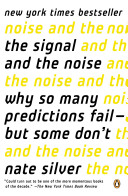A Biased Explanation of Foxes and Hedgehogs
How Foxes Think
Multidisciplinary: Incorporate ideas from different disciplines and regardless of their origin on the political spectrum.
Adaptable: Find a new approach—or pursue multiple approaches at the same time—if they aren’t sure the original one is working.
Self-critical: Sometimes willing (if rarely happy) to acknowledge mistakes in their predictions and accept the blame for them.
Tolerant of complexity: See the universe as complicated, perhaps to the point of many fundamental problems being irresolvable or inherently unpredictable.
Cautious: Express their predictions in probabilistic terms and qualify their opinions.
Empirical: Rely more on observation than theory.
Foxes are better forecasters.
How Hedgehogs Think
Specialized: Often have spent the bulk of their careers on one or two great problems. May view the opinions of “outsiders” skeptically.
Stalwart: Stick to the same “all-in” approach—new data is used to refine the original model.
Stubborn: Mistakes are blamed on bad luck or on idiosyncratic circumstances—a good model had a bad day.
Order-seeking: Expect that the world will be found to abide by relatively simple governing relationships once the signal is identified through the noise.
Confident: Rarely hedge their predictions and are reluctant to change them.
Ideological: Expect that solutions to many day-to-day problems are manifestations of some grander theory or struggle.
Hedgehogs are weaker forecasters.
Notes:
Nate Silver provides a very negative portrayal of those who think like hedgehogs, settling down in one field of expertise, compared to those who think like foxes, darting from field to field.
Folksonomies: metaphors cognition
Taxonomies:
/pets/reptiles (0.634902)
/hobbies and interests/astrology (0.333578)
/careers (0.304204)
Keywords:
Hedgehogs Nate Silver (0.919161 (negative:-0.502219)), simple governing relationships (0.803293 (neutral:0.000000)), circumstances—a good model (0.797947 (negative:-0.813645)), foxes (0.699644 (negative:-0.078202)), Biased Explanation (0.642821 (negative:-0.502219)), weaker forecasters (0.637648 (negative:-0.318158)), negative portrayal (0.631405 (negative:-0.502219)), Incorporate ideas (0.594742 (negative:-0.251860)), new approach—or (0.584881 (neutral:0.000000)), different disciplines (0.583339 (negative:-0.251860)), multiple approaches (0.582852 (neutral:0.000000)), political spectrum (0.578918 (negative:-0.251860)), probabilistic terms (0.578051 (neutral:0.000000)), grander theory (0.557883 (negative:-0.652598)), fundamental problems (0.544595 (neutral:0.000000)), approach—new data (0.543165 (neutral:0.000000)), bad luck (0.539758 (negative:-0.813645)), day-to-day problems (0.535078 (negative:-0.652598)), great problems (0.533214 (negative:-0.203689)), original model (0.510651 (neutral:0.000000)), predictions (0.480778 (negative:-0.400639)), field (0.397814 (neutral:0.000000)), mistakes (0.365034 (negative:-0.658865)), opinions (0.340909 (neutral:0.000000)), Stalwart (0.294930 (neutral:0.000000)), blame (0.289322 (negative:-0.504085)), Tolerant (0.286253 (positive:0.492707)), outsiders (0.281937 (negative:-0.401901)), manifestations (0.277547 (negative:-0.652598)), expertise (0.276970 (neutral:0.000000))
Entities:
Nate Silver:Person (0.895116 (negative:-0.502219)), Stick:Person (0.674838 (neutral:0.000000))
Concepts:
Scientific method (0.947609): dbpedia | freebase
Universe (0.527825): dbpedia | freebase
Critical thinking (0.471209): dbpedia | freebase | opencyc | yago
Hypothesis (0.453827): dbpedia | freebase
Luck (0.428595): dbpedia | freebase | opencyc
Blame (0.428024): dbpedia | freebase | opencyc
The Signal (0.426753): website | dbpedia | freebase | yago
Original sin (0.415345): dbpedia | freebase





